Information regarding Registered Dietitians and Dietitians in Japan
Registered Dietitians and Dietitians
Registered Dietitian
A "Registered Dietitian" is a nutrition expert who has a license issued by the Ministry of Welfare and Labour.
The work performed is the nutrition education required to get medical treatment for the sick or wounded, the nutrition education required to maintain and promote health, which requires a high level of professional knowledge and technique according to the subject's physical and nutritional condition, food service management, which includes special concerns according to the physical, nutritional and utilization conditions at target facilities in order to ensure a continuous supply of meals to a large number of persons, and the education necessary for nutritional improvements at these facilities.
Dietitian
A "Dietitian" is a nutrition expert who has a license issued by the governor of a prefecture.
The work performed is nutrition education as a dietitian.
How to acquire a license as a Registered Dietitian or Dietitian
In order to become a Registered dietitian and/or Dietitian, you must enroll either in a university, junior college or a vocational school that provides a Registered Dietitian / Dietitian training course. You must complete the specialized course to graduate. These educational facilities are called Registered Dietitian / Dietitian training facilities. There are 143 registered dietitian training facilities and 137 dietitian training facilities in Japan. (Reported by the Dietitian Training facility Association in 2015)
Due to the substantial amount of content in this field of study and the requirement for practical training, there are no night-schools, correspondence or online courses that will result in a license as a Registered dietitian and/or Dietitian.
You must pass a national exam to become a registered dietitian, but you can obtain the title of a dietitian by graduating from a dietitian training facility.
Becoming a dietitian requires graduating from a dietitian training facility and obtaining a certificate issued by the prefectural office. Similarly, becoming a registered dietitian requires graduating from a dietitian training facility, as well as passing a national examination for a registered dietitian and obtaining a certificate issued by the Minister of Health, Labour and Welfare. A dietitian can become a registered dietitian using their work experience in the field, in addition to passing the national examination for a registered dietitian. The work experience required differs from the period of study in a dietitian training facility.
To become a Registered Dietitian and/or a Dietitian
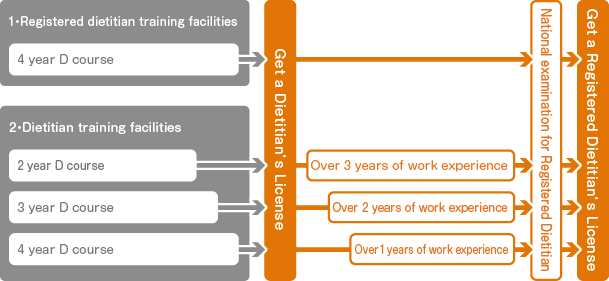
Workplaces for Registered Dietitians and Dietitians
These professions deal with what people consume and its nutritional value.
Some examples of typical workplaces are shown in the pictures below
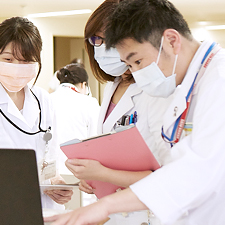
Medical Field
Registered dietitians and dietitian in this field are part of medical teams taking care of patients.Registered dietitians and dietitians in this field work in medical facilities, such as hospitals, managing nutrition for patients, on an individual basis, with several goals, curing diseases, preventing relapses and avoiding medical complications.
They are part of medical teams working in collaboration with other medical professionals, such as doctors, nurses and pharmacists. This role requires a high degree of specialized knowledge and skills.

School lunch
Registered dietitians and dietitians in this area educate children about a balanced diet for proper development.Registered dietitians and dietitians in this field work in elementary and junior high schools, as well as some special schools where they plan school lunch menus and calculate the nutritional requirements of growing children. They also give lessons on diet and nutrition and also offer individual guidance on food allergies, obesity, diabetes and how to improve eating habits.
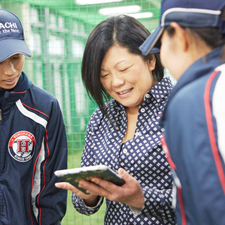
Sports
In this specialized field dietitians provide nutritional advice in order to optimize the performance of athletes.Dietitians in this field provide assistance for a proper diet to sportsmen and women, including children of all aptitudes, including elite athletes. There is a high demand from managers, coaches and sporting associations to provide nutritional support and assistance with the purpose of preventing injuries, as well as improving general physical endurance.
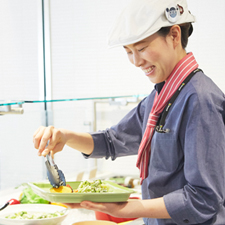
Cafeterias
Here, registered dietitians and dietitians aim at providing a healthy diet to employees and students.Dietitians work in offices, universities, company accommodations and dormitory cafeterias. They are in charge of planning the menus and providing information on a healthy diet and lifestyle to both workers and students, encompassing all ages with different weight problems, and provide appropriate diets tailored to the needs of each individual.
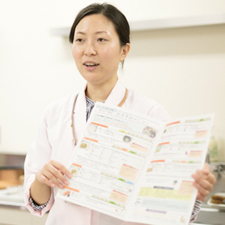
Local governments
Here, registered dietitians and dietitians are in charge of improving the diet, ranging from infants to the elders in the local communities.Registered dietitians and dietitians work in prefectural government offices, city halls and local health centers, planning for the healthcare of the local community, giving public presentations on healthcare matters, and they also act as nutritional consultants. They raise awareness among the people in the local community of the need for proper healthcare using printed material, including guidelines about nutritionally balanced diets and the physical activity required to maintain a healthy lifestyle.
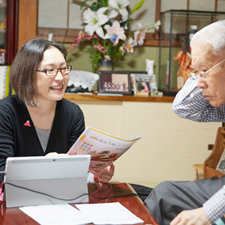
Support in the local community
Here, registered dietitians and dietitians work toward solving health problems of people in the local communities.Registered dietitians and dietitians work within the community by providing healthcare support. The work is very varied, ranging from the advice required to maintain a healthy body to cooking classes. This range extends from working with the sick or providing those in need of a proper diet to working with people in order to prevent the onset of illness. Unlike the working hours in hospitals and other such organizations, their schedule is more flexible in order to fit the individual's lifestyle.
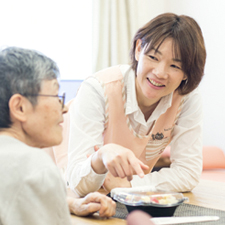
Welfare (elderly・disabled)
Here, registered dietitians and dietitians arrange suitable meals for the elderly and the disabled.Registered dietitians and dietitians work in care centers, such as nursing homes for the elderly and facilities for the disabled. They manage customized nutrition for the elderly and the disabled in order to achieve a more independent and comfortable lifestyle. It is also important to ensure that the elderly and the disabled are provided with a choice of meals with high nutritional value, since their reduced functions include difficulty in eating and swallowing. Registered dietitians and dietitians work together with healthcare workers and other staff to achieve these goals.
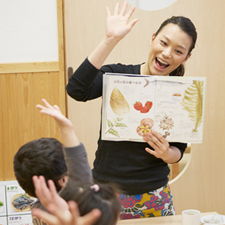
Welfare (children)
Here, registered dietitians and dietitians establish the foundation for children to have a healthy lifestyle.Registered dietitians and dietitians work in nurseries and care centers for children in order to provide a balanced diet, including milk preparation for infants to pre-school aged children. In this area of work it is important to work closely together with parents, care center staff, nurses and doctors to tackle cases of food allergies in children. Another important role is educating young children, in order to generate an interest in food and cooking to enable an independent healthy regime in the future.
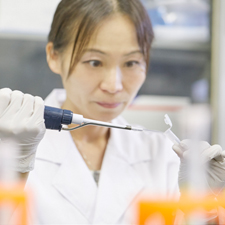
Research and education
Here, registered dietitians and dietitians develop original food products and educate the next generation of dietitians.Registered dietitians and dietitians work for universities or companies, conducting studies, experiments and doing research in developing new products in order to contribute to the local community via national and local cooperation. They also work in dietitian / registered dietitian-training facilities and impart clinical nutrition, as well as school lunch management knowhow. They also provide education in nutrition science, food science and train cooks, care workers and nurses.
Ethical rules for Registered Dietitians and Dietitians
Code of ethics for Registered Dietitians and Dietitians
This code of ethics meets the need for self-realization and the healthy well-being of all of the citizens, and regulates the roles and efforts of the registered dietitians and dietitians, The Nutritional Guidance Society has established a guide to provide the registered dietitians and dietitians with a sense of 1) mission, 2) responsibility, and 3) professional skills.
Established on April 27th 2002 / revised on June 23rd 2014
- Registered dietitians and dietitians should be aware of the dignity and responsibility of the profession in the fields of health, medical, welfare and education. They should devote themselves to improving public health through nutrition guidance based on scientific evidence and advanced technology.
- Registered dietitians and dietitians must treat people with respect and consideration, understanding their human rights and personalities. They should endeavor to gain trust by proper explanation of their nutrition guidance. They should respect and collaborate with colleagues and people involved and meet the needs of all of the citizens.
- The licenses held by registered dietitians and dietitians authorizes them to practice nutritional guidance. They should endeavor to comply with the legal norms and create order. They should always maintain self-discipline and make efforts to maintain professionalism. In addition, they should actively study to maintain and improve their level of knowledge and technology.
(Supplementary Provisions)
Change in this Code shall be approved by the Board of Directors.

